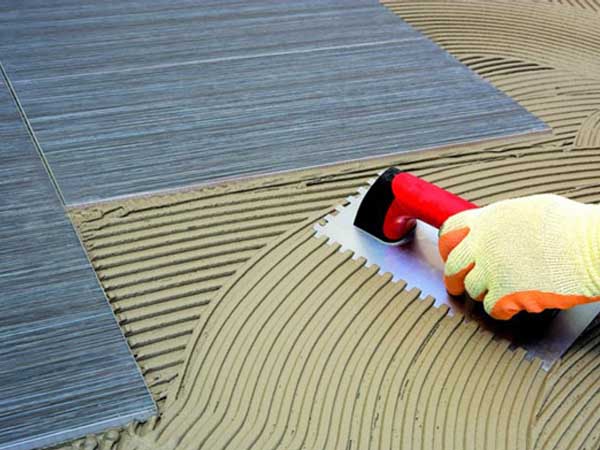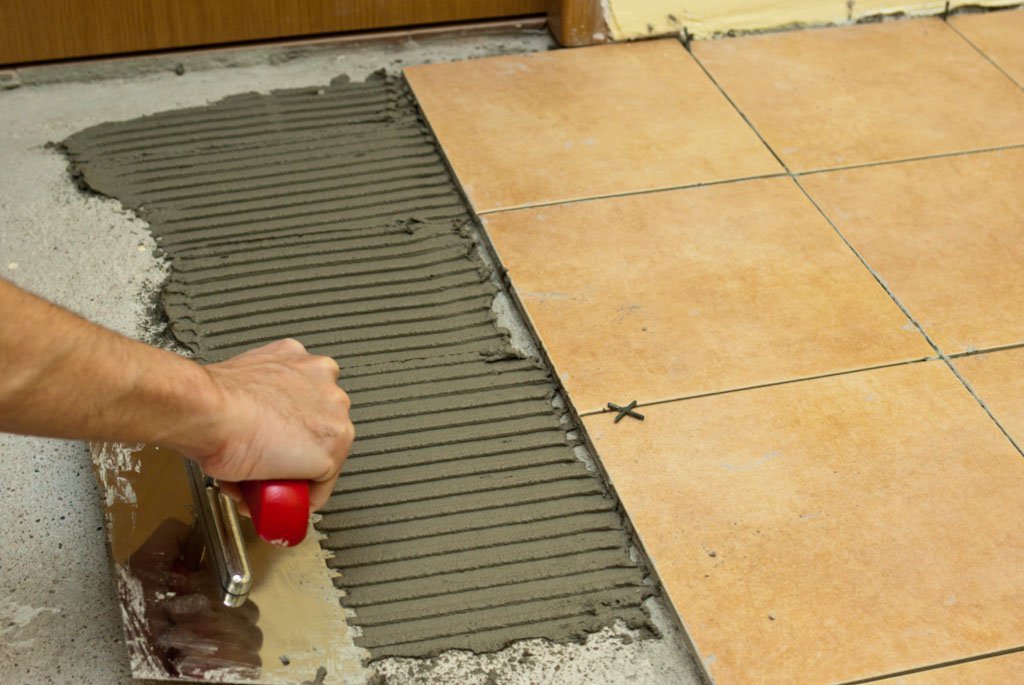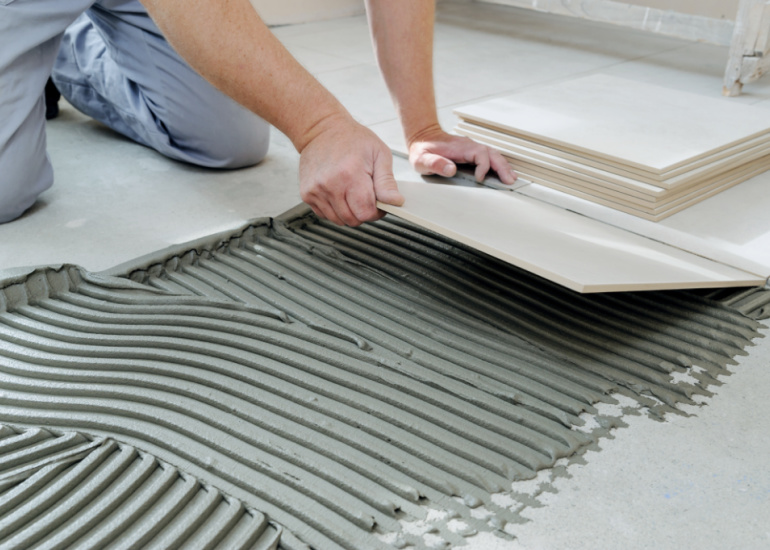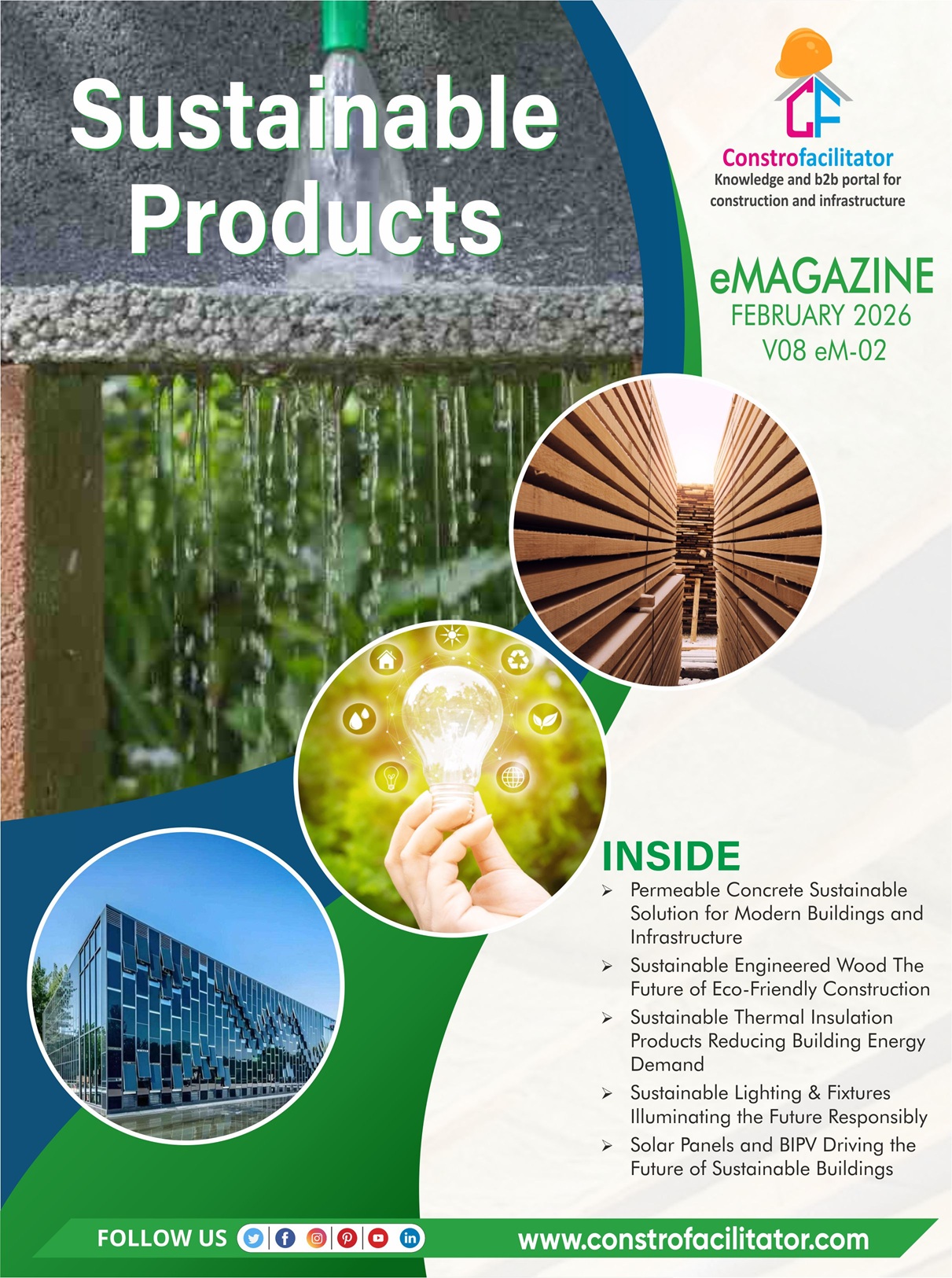Acrylic tile adhesive is a high-performance bonding agent formulated with acrylic resins, providing strong adhesion and flexibility when used in tile installations. This specialised adhesive is formulated with acrylic polymers, providing strong adhesion and flexibility, especially when used in tile installations. Its unique composition allows it to bond various types of tiles, including ceramic, porcelain, glass, and natural stone, to different substrates such as concrete, wood, and drywall. This type of adhesive’s flexibility is paramount, adeptly accommodating minor substrate movements to mitigate the risk of cracks and uphold the durability of tiled surfaces. Moreover, its pre-mixed, ready-to-use formulation streamlines application, affording extended open times for adjustments before setting, thereby enhancing ease and precision in installation processes.
Where are acrylic tile adhesives used?
- Residential buildings
- Commercial building
- Swimming pool
- Industrial facilities
- Manufacturing facilities
- Hospital clean rooms
- Showrooms
- Educational Institutions
- Hotels
- Restaurants
- Warehouses
- Workshops etc.
Advantages of using acrylic tile adhesives:
- Provides a robust and durable bond suitable for various types of tiles.
- Reduces installation time with faster setting properties.
- Maintains performance in fluctuating temperatures.
- Resistant to many chemicals and cleaning agents.
- Formulated to resist mold and mildew growth.
- Versatile for both interior and exterior applications.
- Comprises of ow in volatile organic compounds
- Provides a clean and aesthetic finish resistant to staining.
- Enhances the appearance of tile installations with a smooth application.
- Minimal shrinkage upon curing, maintaining bond integrity.
- Offers adequate time for adjustments during tile installation.
- Suitable for environments experiencing freeze-thaw cycles.
- Can bridge minor cracks in substrates without compromising the bond.
- Offers a balance of performance and affordability.
- Maintains performance and appearance when exposed to sunlight.
- Smooth consistency makes it easy to spread and apply.
Different types of acrylic tile adhesives
Standard Acrylic Tile Adhesive:
Standard acrylic tile adhesive is a versatile option commonly used in construction and renovation projects. Its primary advantage lies in its ability to provide a strong and durable bond between tiles and substrates. This adhesive is formulated to offer flexibility, allowing it to accommodate minor movements in the substrate without compromising the integrity of the installation. Its water-resistant properties make it suitable for use in wet areas such as bathrooms, kitchens, and swimming pools. One of its key features is its ease of use; it typically comes pre-mixed and is easy to apply with a trowel, saving time and effort during installation

Fast-Setting Acrylic Tile Adhesive:
Fast-setting acrylic tile adhesive is designed for projects where time is of the essence. Its main advantage lies in its rapid setting time, which allows for quicker completion of installations compared to traditional adhesives. This feature makes it particularly useful in situations where minimizing downtime is crucial, such as in commercial settings or renovation projects with tight deadlines. Despite its fast-setting properties, it still maintains strong adhesion and durability, ensuring long-lasting results. Its quick setting time allows for faster grouting and tile usage, making it an efficient option for time-sensitive projects.

High-Performance Acrylic Tile Adhesive:
High-performance acrylic tile adhesive is engineered to provide superior bond strength and durability, making it suitable for demanding applications. Its advantage lies in its ability to withstand heavy loads, extreme conditions, and high-traffic areas without compromising its integrity. This adhesive is commonly used in industrial settings, commercial spaces, and other environments where standard adhesives may not suffice. Its enhanced performance ensures reliable results in challenging situations. High-performance acrylic tile adhesive typically offers excellent water resistance, chemical resistance, and thermal stability, making it suitable for installations in areas exposed to moisture, chemicals, and temperature fluctuations.

Flexible Acrylic Tile Adhesive:
Flexible acrylic tile adhesive is formulated to accommodate movement in substrates, offering superior flexibility compared to standard adhesives. Its main advantage is its ability to withstand minor substrate movements without compromising the bond between the tile and the substrate. This makes it an excellent choice for installations on wooden floors, over underfloor heating systems, or in areas prone to temperature fluctuations. Its flexibility helps prevent cracks in the tiles and ensures long-term stability. Flexible acrylic tile adhesive typically offers excellent adhesion to a variety of substrates, including concrete, plaster, and cement board.

Mold-Resistant Acrylic Tile Adhesive:
Mold-resistant acrylic tile adhesive is specifically formulated with additives to inhibit the growth of mold and mildew. Its advantage lies in its ability to maintain a clean and hygienic surface in wet areas prone to moisture accumulation, such as bathrooms and kitchens. By preventing mold growth, this adhesive helps preserve the appearance and integrity of tile installations over time. Its water resistance and mold-inhibiting properties make it an ideal choice for environments where hygiene is paramount. Mold-resistant acrylic tile adhesive typically offers excellent adhesion to a variety of substrates, including drywall, cement board, and concrete.

Non-Sagging Acrylic Tile Adhesive:
Non-sagging acrylic tile adhesive is designed to hold tiles in place without slumping or sagging on vertical surfaces. Its main advantage is its ability to maintain the desired position of tiles during installation, even on walls or ceilings. This ensures precise and uniform tile layouts without the risk of tiles slipping or shifting before the adhesive sets. Its non-sagging properties make it well-suited for wall tile installations, backsplashes, and other vertical surfaces where gravity could affect the bond.

Low-VOC Acrylic Tile Adhesive:
Low-VOC acrylic tile adhesive is formulated with reduced levels of volatile organic compounds, making it a more environmentally friendly option compared to standard adhesives. Its advantage lies in its lower emissions, which contribute to better indoor air quality and reduced environmental impact. This adhesive is suitable for use in residential and commercial settings where occupants may be sensitive to strong odors or where indoor air quality regulations must be met. Despite its lower VOC content, it still delivers strong adhesion and reliable performance.

Heat-Resistant Acrylic Tile Adhesive
Heat-resistant acrylic tile adhesive is formulated to withstand high temperatures, making it ideal for tile installations near sources of heat such as fireplaces, stoves, or radiant heating systems. Its primary advantage lies in its ability to maintain its bond strength and integrity even when exposed to elevated temperatures. This adhesive is designed to resist deformation, cracking, or weakening when subjected to heat, ensuring long-lasting adhesion in challenging environments. Heat-resistant acrylic tile adhesive typically offers excellent adhesion to a variety of substrates, including concrete, cement board, and metal surfaces. Its heat resistance properties make it suitable for use with various tile materials, including ceramic, porcelain, glass, and natural stone, providing a reliable solution for installations where standard adhesives may fail due to heat exposure.

Application method for acrylic tile adhesive
1. Surface Preparation: Clean the surface thoroughly to remove dust, grease, and any loose particles. Ensure the substrate is dry, level, and structurally sound.
2. Mixing: Although acrylic tile adhesive often comes pre-mixed, stir it well to achieve a consistent texture before application.
3. Applying the Adhesive: Use a notched trowel to spread the adhesive onto the substrate. Hold the trowel at a 45-degree angle to create uniform ridges, which help in achieving better adhesion.
4. Setting the Tiles: Press the tiles firmly into the adhesive, applying even pressure to ensure full contact with the adhesive. Slightly twist the tiles to eliminate air pockets and ensure a strong bond.
5. Alignment and Spacing: Use tile spacers to maintain consistent gaps between tiles for grout lines. Check alignment regularly to ensure the tiles are evenly spaced and level.
6. Curing: Allow the adhesive to cure for the recommended time specified by the manufacturer before walking on the tiles or applying grout. This curing time can vary depending on the product and environmental conditions.
7. Grouting: After the adhesive has cured, remove the tile spacers and apply grout to the joints between the tiles. Clean off excess grout with a damp sponge.
Conclusion
Acrylic tile adhesive emerges as a versatile and indispensable solution in construction and renovation, offering numerous advantages across various types and applications. From standard formulations providing robust bonding and water resistance to specialized variants like fast-setting adhesives for time-sensitive projects, the range of acrylic adhesives caters to diverse needs. As a fundamental product in modern construction practices, acrylic tile adhesive plays a pivotal role in achieving superior results in tiling projects of all scales and complexities.





